A Christian Approach to the Environment
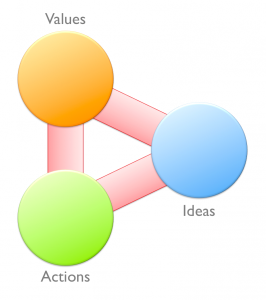 I presented an excerpt of this text as part of Prov(f)talks on November 20, 2014.
I presented an excerpt of this text as part of Prov(f)talks on November 20, 2014.
I’m not sure there is one right way for Christians to understand the environment. If there is, I’m not claiming I know it. Instead, my intention today is to outline my best current understanding.
One of the great things about being at Providence is we get paid, in part, to think.
Over the last few years, I’ve been thinking a bit about the relationship between values, ideas and actions—and especially about how changes in one may have an effect on the others.
Focus
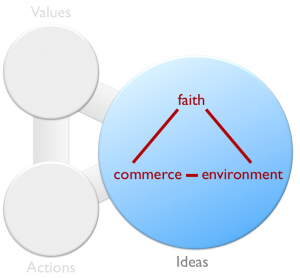 Today I’m only going to concentrate on ideas—not because I think they’re more important than values and actions, but because today’s presentations are brief.
Today I’m only going to concentrate on ideas—not because I think they’re more important than values and actions, but because today’s presentations are brief.
In particular, I’ve been trying to understand the relationship between three clusters of ideas—faith, commerce, and the environment.
For today, for the sake of brevity, let’s narrow the topics a bit more. Let’s think, not about faith in general, but Christian faith. And, for today, let’s look primarily at the relationship between Christian faith and the environment, and leave commerce to one side, at least temporarily.
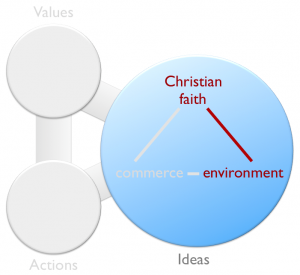 To talk about faith means, of course, that I have to wander into territory where I’m not expert—biblical and theological studies.
To talk about faith means, of course, that I have to wander into territory where I’m not expert—biblical and theological studies.
The relationship between Christian faith and the environment was mapped out in our Guest Speaker series last month.[1] And, in particular, it was covered with both depth and breadth by Gordon Matthies.[2] So I think of what I’m saying today as a footnote on Professor Matthies’ talk.
“Deliberately do at least one foolish thing every year.”
“Deliberately do at least one foolish thing every year.” This is one of the sayings I’ve tried to live by over the past while.
Of course, we’re human, so we all do much more than one foolish thing each year. But the intent of this little slogan is to do at least one foolish thing each year on purpose—deliberately—with your eyes open.
A couple years ago, I got asked to be part of a panel at an interfaith conference. The organizers said, “Bruce, you’re a Christian. We’d like you to you outline how Christians view the environment and the relationship of their view to green issues. And we’d like you to do it in 5 minutes or less.”
Christians have lots of different views about environmental issues, as we do about just about everything else. Explaining those views in 5 minutes—or less—seemed like an impossible thing to do.
So, in keeping with my slogan about foolishness, of course, I said yes.
Today I want to show you what I came up with. And then I want to spend a bit of time explaining why I think one of them—what I’m going to call “’accountable’ Christianity” is the most faithful to the biblical text.
Six Different Ways We Think About Environmental Issues
There are, I’d say, about six different ways that Christians think about environmental issues and the relationship between environmental issues and their faith. I’m naming these six approaches “pantheistic”, “deep green”, “utilitarian”, “apocalyptic”, “individualist”, and “accountable”.
Given how presentations like this are usually structured, it’ll come as no surprise to you that I think the first five are either unbiblical, or incomplete, or both, and that I think the last one I’ll present is the one that best summarizes the relevant Biblical texts.
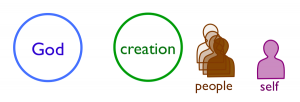 However, my intention is not to caricature the first five approaches. They are serious positions, and are held by many Christians.
However, my intention is not to caricature the first five approaches. They are serious positions, and are held by many Christians.
What I think distinguishes these different views is how we understand the relationship between these four entities—God, the world around us, human beings, and our individual self.
1: “Pantheistic” Christianity
What we might call “pantheistic” Christianity sees God and creation as identical; God and nature are one.
 The Christian version of this view may have emerged as an attempt to reconcile Christian ideas with Enlightenment thinking in the seventeenth and eighteen century,[3] or with Romantic thought in the eighteenth and nineteenth.[4] In the twentieth century, it seemed to emerge when we attempted to harmonize Christian ideas with other religious traditions into religious pluralism.[5]
The Christian version of this view may have emerged as an attempt to reconcile Christian ideas with Enlightenment thinking in the seventeenth and eighteen century,[3] or with Romantic thought in the eighteenth and nineteenth.[4] In the twentieth century, it seemed to emerge when we attempted to harmonize Christian ideas with other religious traditions into religious pluralism.[5]
As nearly as I can tell, there is virtually no basis for this view in biblical texts. One of the core ideas of Abrahamic religions—of Judaism, Christianity and Islam—is that creator and created are distinct.
2: “Deep Green” Christianity
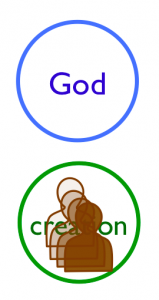 The second view holds that human beings should see themselves as part of nature, as simply one species among all the others.
The second view holds that human beings should see themselves as part of nature, as simply one species among all the others.
It closely echoes what’s called “deep ecology”, an idea developed in the 1970s,[6] and one that, in my experience, many non-Christian environmentalists hold.
“Deep green” Christianity says that the way we are treating the world around us arises from the sin of pride, from arrogance, and from misunderstanding our role in the world.
Although I share the concerns of this view about how we are treating our world, I don’t think the bible allows us to see ourselves as simply one creature among many, one species among many.
3: “Utilitarian” Christianity
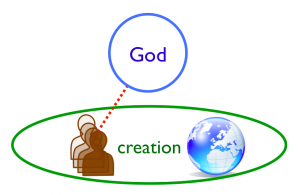 The third approach sees creation in general—and our earth in particular—as an object, given to us by God, to use as we believe to be best. In this view, creation has no intrinsic value; its value arises from its usefulness to human beings.
The third approach sees creation in general—and our earth in particular—as an object, given to us by God, to use as we believe to be best. In this view, creation has no intrinsic value; its value arises from its usefulness to human beings.
I don’t want us to caricature what I’m calling “utilitarian” Christianity and say that it views creation merely as something to be consumed and thrown away. That, of course, wouldn’t be to the long-term benefit of humans. It wouldn’t be utilitarian.
I think a fairer way to describe this view is: It sees God’s sole purpose in creation as providing the raw materials for human well-being.
4: “Apocalyptic” Christianity
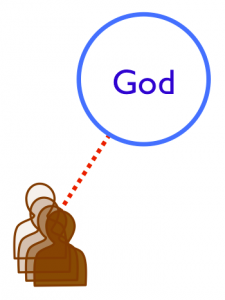 The fourth, which I’m calling “apocalyptic” Christianity, sees the created world as essentially irrelevant to God’s purpose. In this view, God’s sole purpose is to save his people for communion with Him in a new creation.
The fourth, which I’m calling “apocalyptic” Christianity, sees the created world as essentially irrelevant to God’s purpose. In this view, God’s sole purpose is to save his people for communion with Him in a new creation.
The more extreme version of this view might even consider destruction of the earth as a way of precipitating this salvation.
But I’m not interested in constructing and then attacking a straw man, or in dealing with the most extreme possible version of this view.
The more moderate—and perhaps more serious—idea of “apocalyptic” Christianity is to see discussion about creation and the environment as distractions from more fundamental or urgent issues—in particular to focus on the relationship between God’s people and God himself.
5: “Individualist” Christianity
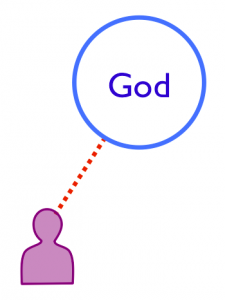 The fifth sees the essential spiritual relationship as personal—between my self and my God.
The fifth sees the essential spiritual relationship as personal—between my self and my God.
It’s what we might call the “embodied theology” of many praise and worship lyrics:
Lord I need You oh I need You
Ev’ry hour I need You
My one defense my righteousness
Oh God how I need You [7]
Bless the Lord O my soul
O my soul
Worship His holy name
Sing like never before
O my soul
I’ll worship Your holy name [8]
My chains are gone I’ve been set free
My God my Savior has ransomed me
And like a flood His mercy rains
Unending love amazing grace [9]
I don’t pick these lyrics to denigrate them. I pick them because I love—and am moved by—all three of these songs. But I do think they exemplify an individualist approach to Christianity.
In my view, the individualist approach, like the apocalyptic, isn’t in contradiction to biblical texts so much as it is incomplete. It focuses on portions of the Biblical texts and ignores others.
6: “Accountable” Christianity
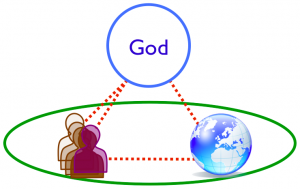 The sixth view—”accountable” Christianity—holds that God is in relationship with us, both as individuals and as members of community. He is also in relationship with creation.
The sixth view—”accountable” Christianity—holds that God is in relationship with us, both as individuals and as members of community. He is also in relationship with creation.
In this view, human beings have a responsibility—both individually and corporately—for God’s creation, and are accountable to him for how well we fulfill that responsibility.
In my remaining minutes, I hope to sketch out why I think “accountable” Christianity is more biblically faithful than the other approaches.
An Old Theology
My intention here is not to develop a new theology of our responsibility for care of creation.
It’s my contention that we don’t need a new theology, that the relevant biblical texts are already sitting in front of us—hiding plain sight.
I’m proposing, not a new theology, but an old one: To read the Bible seriously, and to shape our values, ideas and actions to its guidance. You might call this a conservative theology; you might even call it fundamentalist.
Three Themes
I see three themes running through biblical texts that, I think, call us to hold the view about the environment I’m calling “accountable Christianity”.
Theme 1: God Owns All Creation
The first theme is: God owns all creation.
“The land is mine and you reside in my land as foreigners and strangers.”
Leviticus 25:23 [10]
“Everything under heaven belongs to me.”
Job 41:11
The earth is the Lord’s, and everything in it.
Psalm 24:1
…everything in heaven and earth is yours.
Chronicles 29:11
It would be a mistake, I think, to simply categorize these passages as poetic or metaphorical. They are poetic, of course. But I think we should also accept that they mean what they say.
It is also relevant that God’s ownership is not contingent, but absolute. Human ownership, however, is contingent. One way to understand the Year of Jubilee[11] is as a mechanism for wiping away the illusion that human authority over the land is absolute, and making God’s absolute ownership visible again.[12]
Of course, God as creator of all that exists pervades Biblical texts. But, if we characterize Him as only creator, I think we’re cutting away significant texts.
We are familiar with seeing God as creation’s redeemer.[13] Those of us familiar with Wisdom[14], Augustine[15], or the Catholic catechism[16] may also think of God as the sustainer of creation.
But we also need to recognize Him as owner.
The notion that God made the world and then let it run on its own is foreign to biblical views of the relationship between creator and creation.[17] And the notion that God created the world, and then handed it off to people to do with as they pleased is equally foreign. To be faithful to the text, I think we need to see God, not as the former owner, but as current owner.
But if God is the current owner how, then, are we to understand human dominion?
Theme 2: God Gives Human Beings Responsibility for His Creation
The idea of human dominion over creation comes, of course, from Genesis 1:
Then God said, “Let us make mankind in our image, in our likeness, so that they may rule over the fish in the sea and the birds in the sky, over the livestock and all the wild animals, and over all the creatures that move along the ground.”
Genesis 1:26
If we were to compile a top 10 list of the most misinterpreted verses in the Bible, this verse would be on it.
What the NIV translates as “rule over”, the King James Version translates as “have dominion”. The Hebrew word is רָדָה (radah).
If you are troubled by how human beings are treating creation, you may be tempted to ignore this verse. Or you may look to soften the translation, to play down how much authority we are given.
I’m not in favour of ignoring Bible verses—especially not the ones that make us uncomfortable. In fact, I’d argue that those are exactly the ones we should pay the most attention to.
And even a cursory review of how radah is used elsewhere in biblical texts makes softening the meaning in Genesis untenable.[18]
A better approach, I think, is to take Genesis 1:26 and it’s meaning seriously.
Genesis 1 tells us that God has made us rulers of his creation. Genesis 2 restates that idea when it has God bringing all the animals to the man to name.[19] Genesis 6-9 emphasizes it again when God gives Noah the role of preserving all animals (and all animals’ food) in the ark Noah creates.[20]
But no-where in any Biblical text are we told that we have the right to rule any way we choose.
Theme 3: Any Authority God Gives Humans Comes With Accountability
The love God gives us is unconditional, but the authority he gives us is not.
This is why, in Deuteronomy, Israel’s king is required to copy out the law, to read it every day, and to follow it.[21] This is echoed in 1 Samuel—with the addition here that the conditionality is made explicit:
If you fear the Lord and serve and obey him and do not rebel against his commands, and if both you and the king who reigns over you follow the Lord your God—good! But if you do not obey the Lord, and if you rebel against his commands, his hand will be against you, as it was against your ancestors.
1 Samuel 12:14-15
We see the king’s bounded authority again in 2 Samuel, when the Lord sends Nathan the prophet to rebuke Daniel.
Then Nathan said to David, “…This is what the Lord, the God of Israel, says: ‘I anointed you king over Israel, and I delivered you from the hand of Saul. I gave your master’s house to you, and your master’s wives into your arms. I gave you all Israel and Judah. And if all this had been too little, I would have given you even more. Why did you despise the word of the Lord by doing what is evil in his eyes? You struck down Uriah the Hittite with the sword and took his wife to be your own. You killed him with the sword of the Ammonites. Now, therefore, the sword will never depart from your house, because you despised me and took the wife of Uriah the Hittite to be your own.'”
2 Samuel 12: 7-10
God’s punishment of Daniel is ferocious—and it comes on David after David repents, and even while God continues to love him:
Then David said to Nathan, “I have sinned against the Lord.”
Nathan replied, “The Lord has taken away your sin. You are not going to die. But because by doing this you have shown utter contempt for the Lord, the son born to you will die.”
2 Samuel 12: 13-14
I’ve drawn both of these examples of God holding rulers to account from First and Second Samuel, but I don’t want you to think it’s something peculiar to those two books.
Here are a few other examples:
| prophet | rebukes | ruler(s) | |||
|---|---|---|---|---|---|
| Elijah | → | Ahab | 1 Kings 18:16-18 | ||
| “a prophet” | → | Ahab | 1 Kings 20:42 | ||
| Jehu | → | Jehoshaphat | 2 Chronicles 19:1-2 | ||
| Isaiah | → | “the elders and leaders” | Isaiah 3:14-15 | ||
| Jeremiah | → | Jehoiakim | Jeremiah 35-36 | ||
| Micah | → | “you leaders of Jacob, you rulers of Israel” | Micah 3:1-4 |
To rule is to be held to account.
I think we hear Jesus making a similar point—perhaps even more forcefully—when he teaches his disciples about the authority they will have:
Jesus called them together and said, “You know that those who are regarded as rulers of the Gentiles lord it over them, and their high officials exercise authority over them. Not so with you. Instead, whoever wants to become great among you must be your servant, and whoever wants to be first must be slave of all.”
Mark 10:42-44
Jesus doesn’t talk about accountability just with his disciples, but also in parables.
We can see this in his parable on entrusting wealth to servants (Matthew 25; Luke 19)[22], and in the parable on entrusting a vineyard to tenants (Mark 12; Matthew 21)[23].
We’re used to thinking that we will be held to account at the final judgment, but I think it’s pretty clear that we are accountable, not only in the future, but also in the present.
There are other Biblical texts that emphasize our accountability as followers of Christ, but I think I’ll leave them for you to search for.
Who then is the faithful and wise servant…?[24]
I’m hoping that you accept my notion that these 3 ideas are important themes within Biblical texts:
- God owns all creation
- God gives human beings responsibility for His creation
- any authority God gives humans comes with accountability
And, if you accept my view these are relevant to working out a relationship between Christian faith and the environment, it is right, I think, for us to ask ourselves: When it comes to the earth, have we been faithful and wise servants?
If we go back to Genesis, we can see the kind of earth God intended.
And God said, “Let the water teem with living creatures, and let birds fly above the earth across the vault of the sky.”…God blessed them and said, “Be fruitful and increase in number and fill the water in the seas, and let the birds increase on the earth.”
Genesis 1:20,22
And so, let’s ask ourselves, does the water still teem with living creatures, do the birds still increase on the earth?
A world teeming with life is the world God created, and intended, and judged to be very good. Is that the world over which we now rule?
Northeast Atlantic Cod
Let me take only one example—the cod fishery off Newfoundland.
In the early 1600s, fishermen reported the schools of cod there were sometimes “so thick by the shore that we hardly have been able to row a boat through them.”[25]
This is how much cod people took out of the Northeast Atlantic over the last 60 years[26]:
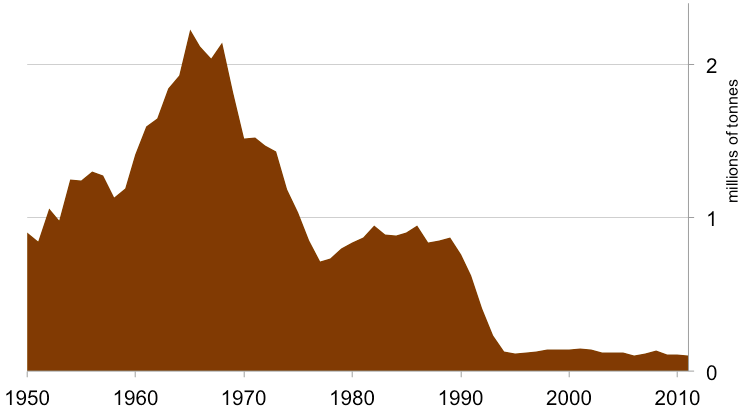 Particularly in the 60’s, we took out much more than the population could sustain. Even worse, throughout this period, the way we fished destroyed the cod’s habitat so that, by the 90’s, the population crashed.
Particularly in the 60’s, we took out much more than the population could sustain. Even worse, throughout this period, the way we fished destroyed the cod’s habitat so that, by the 90’s, the population crashed.
I think it’s fair to say that the collapse of this fishery was not what God intended for his creation. And, if the evidence shows human beings had a hand in this collapse, then I think we must admit that humans were rebelling against God’s will.
Altering God’s Earth
And, of course, the northeast Atlantic cod fishery isn’t an isolated example. The volume of fish in the oceans appears to have declined by 40% in only the past 50 years.[27] And, of course, our actions aren’t affecting only fish.
The evidence is convincing—at least to me—that we are altering the earth in significant ways. The way we take resources from the world—and, just as importantly, how we return our waste to it—I believe violates God’s plan for his creation, and goes against his requirements of us. It seems to me that how we have acted as rulers of God’s creation falls far short of God’s plan.
Values, Ideas & Actions
While this is, I hope, a sober assessment of our failures, please don’t interpret it as one of despair.
 We are not helpless in the face of our failures.
God has given us authority, but he’s also given us the ability to act. There is a great deal we can do.
We are not helpless in the face of our failures.
God has given us authority, but he’s also given us the ability to act. There is a great deal we can do.
And this why I think it is important to understand the connections between these three spheres—between our ideas, our values and our actions.
I’m not suggesting our actions can save or redeem us. But my experience is that taking action can help us flesh out and deepen our ideas.
And the actions we take can help us live out our values. They are how we respond to the responsibility God has given us.
Coda
Faith by itself, if it is not accompanied by action, is dead….Was not our father Abraham considered righteous for what he did when he offered his son Isaac on the altar? You see that his faith and his actions were working together, and his faith was made complete by what he did.
James 2:17,22
My experience in working with non-Christians who are concerned with the environment is that, if they know I’m a Christian, they will judge my faith by my actions. What I say will matter very little, but what I do will matter a lot.
And they will judge, not only my individual actions, but also the actions I take as a member of the larger community.
I think this is fair.
Jesus said, “Make a tree good and its fruit will be good, or make a tree bad and its fruit will be bad, for a tree is recognized by its fruit.”
Matthew 12:33
This can be sobering, because I know my actions always fall short of righteousness. But, in a world skeptical of Christianity, our actions are usually the most powerful form of evangelism we have.
Footnotes
[1] Providence University College Guest Symposium, October 29, 2014.
[2] Gordon Matties. October 29, 2014. “Beyond Sustainability and Salvation: A Biblical Theology for a Groaning Creation”.
[3] Probably first directly stated by Spinoza: “That eternal and infinite being we call God, or Nature, acts from the same necessity from which he exists.” (Ethics. Part IV, Preface). See Nadler, Steven, “Baruch Spinoza”, The Stanford Encyclopedia of Philosophy (Fall 2013 Edition), Edward N. Zalta (ed.), http://plato.stanford.edu/archives/fall2013/entries/spinoza/
[4] An early example would be William Wordsworth’s “Lines Composed a Few Miles Above Tintern Abbey”:
“…I have felt
A presence that disturbs me with the joy
Of elevated thoughts; a sense sublime
Of something far more deeply interfused,
Whose dwelling is the light of setting suns,
And the round ocean and the living air,
And the blue sky, and in the mind of man;
A motion and a spirit, that impels
All thinking things, all objects of all thought,
And rolls through all things.”
[5] Although he’s far from the first to take this approach, one of the more prominent at the end of the twentieth century was Bishop Spong: “The Hindu path of righteousness called ‘yoga’ is not far removed from the disciplines of the Christian life that we call ‘the way of the cross.’ Both religious systems address universal human questions: the traumas of existence, the loneliness experienced by self-conscious lives in a vast universe, the reality of death, the illusion of individualism. Hinduism sees a unity between the physical and nonphysical worlds, between the human and the animal, between the human and the divine. Such unities are also being explored in modern physics and psychology as well as by Christian mystics and twentieth-century theologians such as Teilhard de Chardin.”…
“Christianity and Hinduism both seek from a sense of alienation to be at one with the universe….I am convinced that a religious unity that we have not dared hope for might now be dawning. Perhaps in the next hundred years we will come to think of the religions of the world as being as similar to one another as we today think the denominations of Christianity to be. That would be a major breakthrough in consciousness. To me such is not only possible, it is highly desirable.”
Excerpts from The Bishop’s Voice: Selected Essays, 1979-1999 by Bishop John Shelby Spong, compiled and edited by Christine Spong. Accessed December 31, 2014 from http://www.spiritualityandpractice.com/books/excerpts.php?id=13409.
[6] Perhaps the best easily-available summary of Deep Ecology is on Wikipedia: http://en.wikipedia.org/wiki/Deep_ecology.
[7] Christy Nockels, Daniel Carson, Jesse Reeves, Kristian Stanfill, Matt Maher. 2011. Lord I Need You. sixsteps Music (administered by Capitol CMG Publishing). Accessed December 27, 2014 from https://ca.songselect.com/songs/5925687/lord-i-need-you/viewlyrics.
[8] Jonas Myrin and Matt Redman. 2011. 10,000 Reasons (Bless The Lord). Said And Done Music (administered by Capitol CMG Publishing). Accessed December 27, 2014 from https://ca.songselect.com/songs/6016351/10-000-reasons-bless-the-lord/viewlyrics.
[9] Chris Tomlin, John Newton, and Louie Giglio. 2006. Amazing Grace (My Chains Are Gone). sixsteps Music (administered by Capitol CMG Publishing). Accessed December 27, 2014 from https://ca.songselect.com/songs/4768151/amazing-grace-my-chains-are-gone/viewlyrics.
[10] All biblical quotations, unless otherwise indicated, are from the New International Version.
[11] The Lord said to Moses at Mount Sinai….”Consecrate the fiftieth year and proclaim liberty throughout the land to all its inhabitants. It shall be a jubilee for you; each of you is to return to your family property….The land must not be sold permanently, because the land is mine and you reside in my land as foreigners and strangers. Throughout the land that you hold as a possession, you must provide for the redemption of the land.” (Leviticus 25)
[12] God’s absolute right of ownership extends as far as it possibly can—to the unquestioned right of destruction: So the Lord said, “I will wipe from the face of the earth the human race I have created—and with them the animals, the birds and the creatures that move along the ground—for I regret that I have made them.” (Genesis 6:7)
[13] The Son is the image of the invisible God….He is before all things, and in him all things hold together….For God was pleased to have all his fullness dwell in him, and through him to reconcile to himself all things, whether things on earth or things in heaven, by making peace through his blood, shed on the cross….This is the gospel that you heard and that has been proclaimed to every creature under heaven… (Colossians 1)
[14] For you love all things that exist, and detest none of the things that you have made; for you would not have made anything if you had hated it. How would anything have endured, if you had not willed it? Or how would anything not called forth by you have been preserved? You spare all things, for they are yours, O Lord, you who love the living. (Wisdom 11:26)
[15] “Let us therefore believe that God works constantly, so that all created things would perish, if his working were withdrawn.” Augustine of Hippo. On Genesis. Translated by E. Hill. The Works of Saint Augustine, part I, vol. 13. Brooklyn: New City Press, 2002.
[16] “With creation, God does not abandon his creatures to themselves. He not only gives them being and existence, but also, and at every moment, upholds and sustains them in being, enables them to act and brings them to their final end. Recognizing this utter dependence with respect to the Creator is a source of wisdom and freedom, of joy and confidence…” Catechism of the Catholic Church. Para. 301. http://www.vatican.va/archive/ENG0015/__P19.HTM
[17] One of the places where the creator’s current relationship with his creation is explored at length is in God’s responses to Job. In them, God’s engagement reaches from greatest forces in nature…
Or loose the cords of Orion? (Job 38:31)
…to the care of young birds:
When its young cry to God…? (Job 38:41)
[18] A few representative examples of radah’s use:
…you must not rule over your fellow Israelites ruthlessly. (Leviticus 25:43. See also Leviticus 25:46,53).
“I will set my face against you so that you will be defeated by your enemies; those who hate you will rule over you, and you will flee even when no one is pursuing you.” (Leviticus 26:17)
“[Solomon] ruled over all the kingdoms west of the Euphrates River, from Tiphsah to Gaza, and had peace on all sides.” (1 Kings 4:24)
“Then you abandoned them to the hand of their enemies so that they ruled over them.” (Nehimiah 9:28)
May he rule from sea to sea
and from the River to the ends of the earth. (Psalm 72:8)
The Lord will extend your mighty scepter from Zion, saying,
“Rule in the midst of your enemies!” (Psalm 110:2)
“I will make [Egypt] so weak that it will never again rule over the nations.” (Ezekiel 29:15)
[19] Now the Lord God had formed out of the ground all the wild animals and all the birds in the sky. He brought them to the man to see what he would name them; and whatever the man called each living creature, that was its name. (Genesis 2:19)
[20] The unique role of humans continues after the flood: Then God blessed Noah and his sons, saying to them, “Be fruitful and increase in number and fill the earth. The fear and dread of you will fall on all the beasts of the earth, and on all the birds in the sky, on every creature that moves along the ground, and on all the fish in the sea; they are given into your hands. Everything that lives and moves about will be food for you. Just as I gave you the green plants, I now give you everything.” (Genesis 9:1-3)
[21] “When [your king] takes the throne of his kingdom, he is to write for himself on a scroll a copy of this law, taken from that of the Levitical priests. It is to be with him, and he is to read it all the days of his life so that he may learn to revere the Lord his God and follow carefully all the words of this law and these decrees and not consider himself better than his fellow Israelites and turn from the law to the right or to the left. Then he and his descendants will reign a long time over his kingdom in Israel.” (Deuteronomy 17:18-20)
[22] “[The kingdom of heaven] will be like a man going on a journey, who called his servants and entrusted his wealth to them. To one he gave five bags of gold, to another two bags, and to another one bag, each according to his ability. Then he went on his journey.” (Matthew 25:14-15)
[23] “There was a landowner who planted a vineyard. He put a wall around it, dug a winepress in it and built a watchtower. Then he rented the vineyard to some farmers and moved to another place.” (Matthew 21:33)
[24] Matthew 24; Luke 12.
[25] John Mason, A Briefe Discourse of the New-Found-Land (Edinburgh: Andro Hart, 1620), pages not numbered.
[26] FAO Fisheries Department (FAO- FI), “Review of the state of world marine fishery resources 2011. Marine resources – Northwest Atlantic, 2009. FIRMS Reports.” in Fishery Resources Monitoring System (FIRMS) (Rome: FAO, updated 12 June 2013), accessed December 31, 2014, http://firms.fao.org/firms/resource/10532/en.
[27] World Wildlife Fund. Living Plant Report 2014. http://bit.ly/1ssxx5m.
